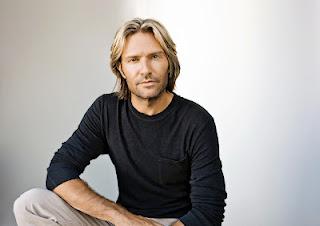Innanzitutto abbiamo chiesto ad Eric da dove viene la sua passione per la musica, e come ha cominciato a suonare e comporre: ci ha rivelato che da bambino amava moltissimo la musica, anche se non l'ha studiata. Avendo un pianoforte a casa, molto spesso suonava a orecchio alcuni brani e motivetti. All'età di quattordici anni ha fatto una pubblicità per McDonald's, e con i soldi ottenuti si è comprato il primo sintetizzatore e la prima batteria, passando gli anni dei liceo a comporre musica pop, sempre a orecchio. Una volta al college è entrato nel coro, e da lì non ha mai più smesso. [video]
Eric ha incominciato dunque a studiare musica dal punto di vista tecnico molto tardi, e confessa di avere ancora problemi a scriverla, non è qualcosa che gli viene in modo completamente naturale, nonostante oramai abbia un Master. [video]
Abbiamo chiesto da dove è venuta l'idea per il Virtual Choir: diverso tempo fa una fan ha postato un video su Youtube, in cui cantava la parte del soprano di “Sleep”. E' stato in quel momento che Eric ha avuto l'idea: se si potesse convincere 50 persone a cantare in chiave e tempo corretti, e si facessero partire tutti i video contemporaneamente, allora si dovrebbe ottenere un coro, dovrebbe funzionare. [video]
 Tecnicamente il progetto ha richiesto moltissimo lavoro, specialmente per la parte di pulizia e sincronizzazione dei brani: molto spesso infatti le registrazioni avevano rumore di fondo da pulire, e non erano perfettamente allineate. Paradossalmente, tuttavia, ci è voluto lo stesso tempo – 3 mesi – per completare l'editing di Lux Aurumque e Sleep, nonostante quest'ultimo avesse più di dieci volte la quantità di video di Lux Aurumque: questo perché per il primo video tutto il lavoro è stato svolto da una sola persona, mentre per il secondo erano previsti due team, uno per la parte audio e l'altro per la parte video. [video]
Tecnicamente il progetto ha richiesto moltissimo lavoro, specialmente per la parte di pulizia e sincronizzazione dei brani: molto spesso infatti le registrazioni avevano rumore di fondo da pulire, e non erano perfettamente allineate. Paradossalmente, tuttavia, ci è voluto lo stesso tempo – 3 mesi – per completare l'editing di Lux Aurumque e Sleep, nonostante quest'ultimo avesse più di dieci volte la quantità di video di Lux Aurumque: questo perché per il primo video tutto il lavoro è stato svolto da una sola persona, mentre per il secondo erano previsti due team, uno per la parte audio e l'altro per la parte video. [video]Abbiamo chiesto a Eric se pensa che sia possibile fare lo stesso tipo di progetto anche per altre discipline artistiche, e lui ci ha svelato che per lui il prossimo passo sarebbe naturalmente la danza. Sarebbe molto interessante raccogliere video di persone che ballano, con una coreografia preimpostata, e infine editarli così come è stato fatto nel caso di Virtual Choir: sarebbe addirittura possibile costruire immagini usando i vari video, ma naturalmente si sta cominciando solo ora a esplorare le infinite possibilità che questo tipo di approccio offre. [video]
Eric ci ha svelato anche quali sono le sue più grandi fonti di ispirazione dal mondo della musica classica: in primo luogo la Nona di Beethoven, seguita da La sagra della primavera di Stravinsky, e praticamente qualsiasi cosa composta da Bach. Tra i compositori più recenti, invece, Eric elenca John Adams, compositore americano, Arvo Pärt, compositore estone, e Anders Hillborg, svedese. [video]
Per quanto le modalità per ascoltare nuova musica ed esplorare sempre nuovi territori, Eric ci ha raccontato di avere fondamentalmente due fonti: in primo luogo i suggerimenti e i consigli di ascolto degli amici, e in secondo luogo l'esplorazione di YouTube, passando da un video all'altro. Recentemente, i suoi fan hanno cominciato a condividere musica anche sulla sua fanpage, offrendo una ulteriore fonte di ispirazione. [video]
La nostra ultima domanda verte intorno all'utilità di strumenti come iTunes Genius o altri algoritmi rispetto a un approccio maggiormente orientato ai social network: dopo averci parlato di Netflix e del loro accuratissimo algoritmo, tuttavia, Eric ha espresso una preoccupazione in merito a un utilizzo esclusivo di questo genere di strumenti. Gli algoritmi si basano su cose già viste o aggiunte ai preferiti, e probabilmente diventeranno sempre più raffinati, ma il problema è che faranno sempre vedere quello che potrebbe piacere, e mai cose realmente nuove e diverse. [video]
Invito tutti a visionare l'intervista integrale, molto ricca di dettagli e riflessioni!
Buona visione!
Maria Petrescu
Intervistato.com | Eric Whitacre
Some time ago we had the pleasure of interviewing Eric Whitacre, American composer renown as the creator of the Virtual Choir project, which today counts three songs: Lux Aurumque, Sleep and Water Night.
First of all we asked Eric where his passion for music comes from, how he started playing and composing: he revealed that as a child he loved music, but wasn't formally trained. He had a piano at home, so he would often pick up tunes by ear and play them. At the age of 14 he was cast in a nationwide McDonald's commercial, and with the money he earned, he bought his first synthetizer and drum machines, and spent his highschool years composing pop music by ear. In college he entered the choir, and he was hooked forever. [video]
Eric started to formally train in music very late, and he confessed that writing it down still doesn't come naturally to him, even after all these years. [video]
We asked where the idea for the Virtual Choir came from: some time ago a fan posted a video on YouTube, in which she sang the soprano part for "Sleep". It was in that moment that Eric had the idea: if you could get 50 people to sing in the right tempo and key, and then you started all the videos at the same time, it would have to be a choir, it should work. [video]
Technically the project required a lot of work, especially for the cleaning and sincronizing part: very often the recordings had several noises to clean, and weren't quite perfectly aligned. Ironically it took the same amount of time - 3 months - to do the editing for both Lux Aurumque and Sleep, even though the latter had ten times more video tracks than the first one, and this happened because the first video was entirely done by one person, while for the second there were two teams, one for the audio part, and one for the video. [video]
We asked Eric if he thinks it is possible to do the same kind of thing for other artistic crafts, and he said that the next step would have to be dance. It would be extremely interesting to take videos of people dancing, with a predetermined coreography, and then edit them in the same way they did for the Virtual Choir: it would even be possible to build images, but of course we're just beginning to scratch the surface of what's possible to do with this approach. [video]
Eric revealed which are his biggest sources of inspiration from the world of classical music: first of all Beethoven's Ninth Symphony, the Rite of Spring by Stravinsky and basically anything composed by Bach. Among more recent composers, Eric prefers John Adams, an American composer, Arvo Part, an Estonian composer, and finally Anders Hillborg, a Swedish composer. [video]
As for the ways to discover new music and explore new territories, Eric told us that he fundamentally uses two sources: suggestions of friends, and the exploration of YouTube, bouncing from one track to the other. Also, his fans started sharing music with him on his fanpage, offering yet another source of inspiration. [video]
Our last question is about the utility of tools such as the iTunes Genius or other algorithms in comparison with a social approach: after speaking about Netflix and their extremely accurate and impressive algorithm, Eric expressed his worries regarding an exclusive use of these kinds of tools. Algorithms are based on things that have been seen or liked in the past, and they probably will become more and more refined, but the problem is that they will always show what you like, not necessarily what you need. [video]
I invite you to view the full interview, much richer in details and insights!
Enjoy!
Maria Petrescu







